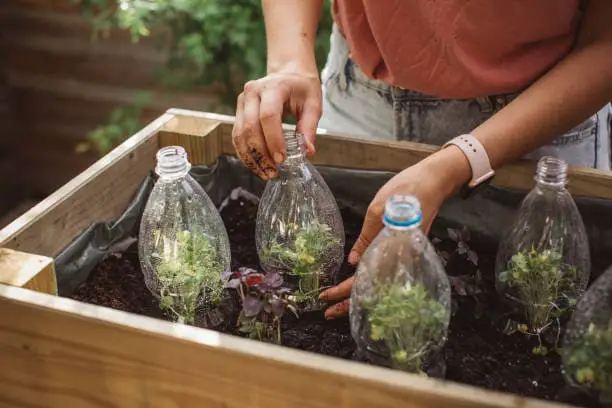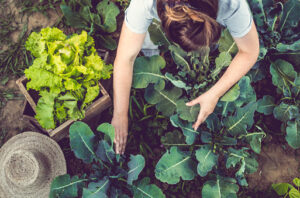Container gardening is a great way to garden if you don’t have a lot of space. You can grow vegetables, flowers, and herbs in containers on your patio, balcony, or porch. This blog post will teach you how to plant a container garden and give you some tips on what plants to choose.
Table of Contents
- 1 What Is Container Gardening and How Does It Work?
- 2 Some Tips for Container Gardening
- 3 How to Get Started with Your Container Garden
- 3.1 Choose the suitable vegetables to grow in containers
- 3.2 Choose the correct container for your plants
- 3.3 Fill your container with potting mix
- 3.4 Water your plants regularly
- 3.5 Fertilize your plants every few weeks
- 3.6 Protect your plants from pests
- 3.7 Amend the soil with compost or manure
- 3.8 Harvest your vegetables when they’re ready
- 4 Tips for Keeping Your Container Garden Healthy and Thriving All Season Long
- 5 Container Gardening Ideas for Every Type of Gardener
- 6 What Are Some Common Mistakes You Can Make?
What Is Container Gardening and How Does It Work?
Container gardening is a type of gardening where you grow plants in containers instead of in the ground. The container can be anything from a pot to a recycled container. Container gardens are great for small spaces and can be placed on your patio, balcony, or porch.
If you’re new to container gardening, start with easy-to-grow vegetables like lettuce, tomatoes, or herbs. Once you have a little more experienced, you can try planting flowers or other vegetables.
Some Tips for Container Gardening
- Choose the right container. Make sure your container has drainage holes so that the water can drain out. If you’re using a recycled container, make sure it’s clean and has no holes in it.
- Use good quality potting mix. This will help your plants grow healthy and strong.
- Water your plants regularly. Container gardens need to be watered more often than gardens in the ground because the soil dries out quickly.
- Fertilize your plants every few weeks. This will help them grow big and healthy.
- Protect your plants from pests. Check your plants regularly for pests and diseases. If you find any, treat them immediately.
Container gardening is a great way to garden if you don’t have a lot of space. You can grow vegetables, flowers, and herbs in containers on your patio, balcony, or porch.
How to Get Started with Your Container Garden
Choose the suitable vegetables to grow in containers
The container you use will also affect what vegetables you can grow. Some vegetables, like carrots and potatoes, need a deep container to grow in, while others, like lettuce and tomatoes, can be grown in shallower containers. Here are some vegetables that are easy to grow in containers:
- Lettuce
- Tomatoes
- Cucumbers
- Peppers
- Eggplants
- Beans
- Herbs
Choose the correct container for your plants
Once you’ve chosen what vegetables you want to grow, it’s time to choose the right container. The size of the container will depend on the plant you’re growing. For example, tomatoes need a large container, while lettuce only needs a small container. Here are some things to keep in mind when choosing a container:
- Make sure the container has drainage holes.
- The container should be big enough for the plant to grow, but not too big.
- If you’re using a recycled container, make sure it’s clean and has no holes in it.
Fill your container with potting mix
Once you’ve chosen the right container, it’s time to fill it with potting mix. Potting mix is a special type of soil that’s made for containers. It’s light and airy, which helps the roots of your plants get the oxygen they need to grow. Here are some things to keep in mind when choosing potting mix:
- Choose a good quality potting mix.
- Make sure the potting mix is moist, but not too wet.
Water your plants regularly
Container gardens need to be watered more often than gardens in the ground because the soil dries out quickly. Water your plants whenever the soil feels dry to the touch. Be careful not to overwater your plants, as this can kill them.
Fertilize your plants every few weeks
Fertilizing your plants will help them grow big and healthy. Use a liquid fertilizer and apply it to the soil every two weeks. You can also add slow-release fertilizer to the soil when you plant your vegetables. This will provide nutrients to the plants for a longer period.
Protect your plants from pests
Check your plants regularly for pests and diseases. If you find any, treat them immediately. Some common pests that attack container gardens are aphids, whiteflies, and spider mites. You can get rid of these pests by spraying them with water or using an insecticide.
Amend the soil with compost or manure
Compost or manure will help your plants grow healthy and strong. Add it to the soil every few months to give your plants the nutrients they need.
Harvest your vegetables when they’re ready
Once your vegetables are big and ripe, it’s time to harvest them.
Enjoy your homegrown food!
Tips for Keeping Your Container Garden Healthy and Thriving All Season Long
- Water your plants regularly.
- Fertilize your plants every few weeks.
- Protect your plants from pests.
- Amend the soil with compost or manure.
- Harvest your vegetables when they’re ready.
With a little care and attention, you can grow a healthy and bountiful container garden.
Container Gardening Ideas for Every Type of Gardener
If you’re new to container gardening, start with a few easy-to-grow vegetables. Once you’ve mastered the basics, you can try your hand at more challenging plants. Here are some container gardening ideas for every type of gardener:
- Beginner: Lettuce, tomatoes, cucumbers, beans
- Intermediate: Peppers, eggplants, herbs
- Advanced: Carrots, potatoes, squash
What Are Some Common Mistakes You Can Make?
Here are some common mistakes container gardeners make:
- Not watering regularly enough.
- Overwatering the plants.
- Not fertilizing the plants.
- Not protecting the plants from pests and diseases.
- Not harvesting the vegetables when they’re ripe.
By avoiding these mistakes, you’ll be well on your way to growing a healthy and bountiful container garden.
Container gardening is a great way to get started with gardening. It’s easy to do and doesn’t require a lot of space. With a little bit of care, you can grow healthy plants that will provide you with fresh vegetables all season long. So what are you waiting for? Get started today!




